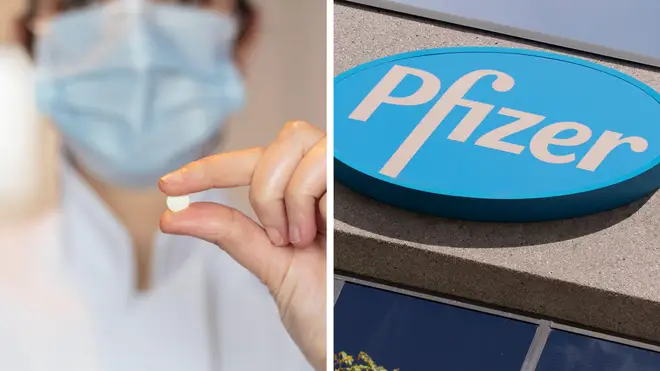
Clive Bull 1am - 4am
5 November 2021, 12:04 | Updated: 5 November 2021, 12:17

An antiviral pill manufactured by Pfizer has been found to reduce the risk of hospitalisation and death from Covid by nearly 90 per cent, according to the pharmaceutical company's preliminary results from 775 adults.
Pfizer said the drug reduced hospitalisation or death by 89 per cent, compared to patients taking a placebo.
The company has said it will ask the Food and Drug Administration (FDA) and international regulators to authorise its pill as soon as possible, after independent experts recommended halting the company's study based on the strength of its results - standard procedure when interim results show such a clear benefit.
Once Pfizer applies, the FDA could make a decision within weeks or months.
The UK has already ordered 250,000 of the Pfizer treatment, which, if approved, will be sold under the brand name Paxlovid.
Read more: 'Game-changing' anti-viral pill treatment for Covid approved on 'historic day' for UK
Read more: Hertfordshire schools told to reintroduce face masks as Covid cases surge
The UK has also secured another deal for another antiviral called Molnupiravir, which was approved by the Medicines and Healthcare products Regulatory Agency (MHRA) on Thursday.
It makes the UK the first country in the world to approve an antiviral that can be taken at home all Covid-19.
Whilst this drug is currently under review at the Food at Drug Administration (FDA), currently, all treatments in the US require an IV or injection.
Researchers worldwide have been racing to find a pill against Covid-19 that can be taken at home to ease symptoms, speed recovery and reduce the crushing burden on hospitals and doctors.
According to the preliminary results, fewer than 1 per cent of patients taking the Pfizer drug needed to be admitted to hospital and no-one died.
In the comparison group, 7 per cent were admitted to hospital and there were seven deaths.
"We were hoping that we had something extraordinary, but it's rare that you see great drugs come through with almost 90 per cent efficacy and 100 per cent protection for death," said Dr Mikael Dolsten, Pfizer's chief scientific officer, in an interview.

Cross-panel clash over mandated vaccines for health workers
Study participants were unvaccinated, with mild-to-moderate Covid-19, and were considered high risk for hospital admission due to health problems such as obesity, diabetes or heart disease.
Treatment began within three to five days of initial symptoms, and lasted for five days.
Pfizer reported few details on side effects but said rates of problems were similar between the groups at about 20 per cent.
The data has not yet been published for outside review, the normal process for vetting new medical research.
Read more: 28 million 'extra years of life' lost in 2020 due to Covid
Read more: 'No plans whatsoever' for schools to close again due to Covid
Top US health officials continue to stress that vaccination will remain the best way to protect against infection.
But with tens of millions of adults still unvaccinated - and many more globally - effective, easy-to-use treatments will be critical to curbing future waves of infections.
Pfizer's drug is part of a decades-old family of antiviral drugs known as protease inhibitors, which revolutionised the treatment of HIV and hepatitis C.
The drugs block a key enzyme which viruses need to multiply in the human body, and was first identified during the Sars outbreak originating in Asia during 2003.